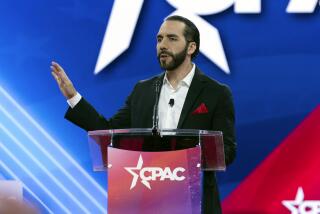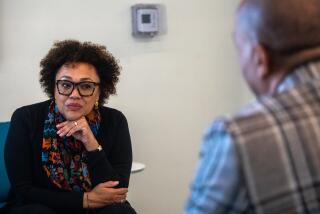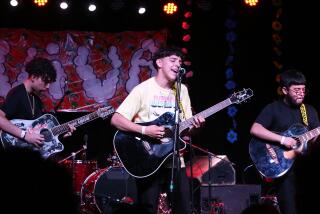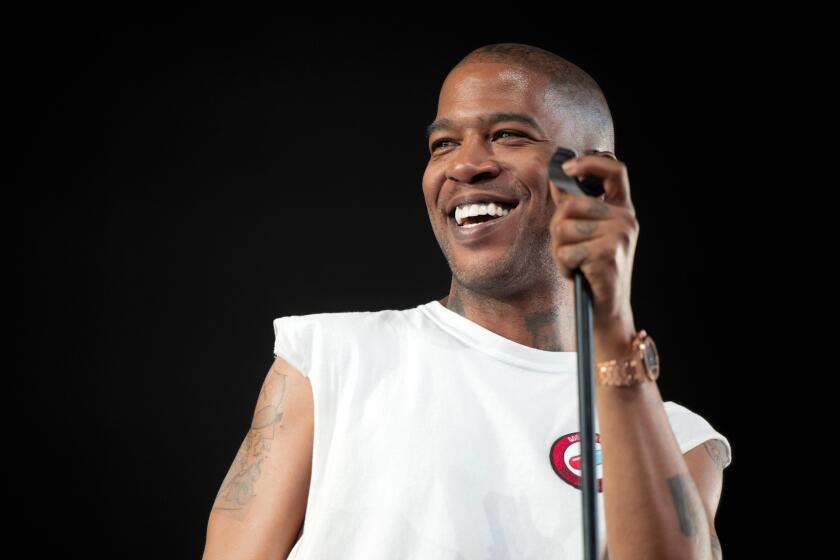The ‘nueva trova’ music of Cuba’s Carlos Varela feels as timely as ever
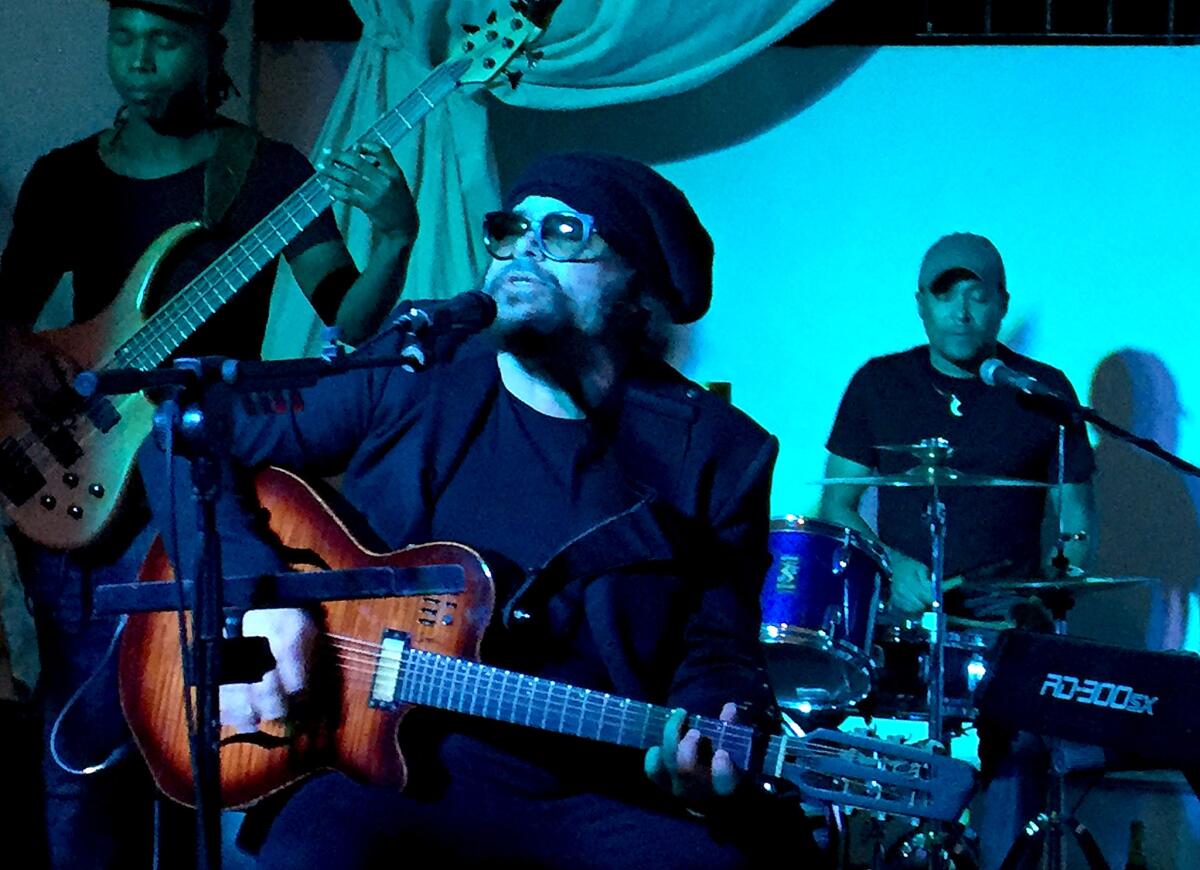
Coming from a Spanish-speaking musician, the song “Muros y Puertas (Walls and Doors),” could easily have been interpreted as a response to one of the key campaign promises of President-elect Donald Trump, especially as Cuban singer-songwriter Carlos Varela passionately sang it on the patio of an elegant private restaurant in Havana just days after the U.S. presidential election.
Translated, the song says, “Since the world has existed, one thing is certain: Some build walls, and others open doors.”
But Varela, part of the nueva trova class of Cuban troubadours that first sprouted in the late 1960s, wrote the song years ago. It has gained more widespread following in the English-language pop music world since Varela enthusiast Jackson Browne recorded his version of the poignant ballad on his 2014 album “Standing in the Breach.”
See the most-read stories in Entertainment this hour »
“He’s a great singer and musician who’s been very influenced by American rock ’n’ roll,” Browne told The Times recently.
Varela’s song is a meditation on differing sets of priorities among different people, using language that has helped him earn widespread acclaim for his eloquent songwriting over the last three decades.
His infectious melange of Western rock and traditional Cuban son elements makes for a gripping cross-cultural blend. His band can seamlessly segue into extended instrumental sections that are part jazz improvisation, part jam band musical exchanges (“It’s very free,” he said.)
“That’s why they refer to him as ‘the Poet of Havana’ or ‘the Bob Dylan of Cuba’ — they’re trying to get across that he’s talking about something important,” Browne said. “The Cuban people universally recognize him, and although they may differ with one another about a lot of things, they all agree about him.”
Case in point: Cubans and Cuban Americans are often divided along generational and geographical lines over social, political and cultural issues.
But Varela was cheered with equal enthusiasm in Havana by Cubans craning from the street for a glimpse into an intimate show he gave in November for a group of U.S. visitors as he was by a cadre of Cuban Americans who held a Cuban flag aloft and sang passionately along with his songs for a performance three weeks later in San Francisco.
Take these lines from “Muros y Puertas” — “De que sirve la luna /si no tienes la noche/De que sirve un molino/sino quedan Quijotes.” (Of what use is the moon if you don’t have the night/Of what use is a windmill with no Quixotes left who’ll fight).
“Silvio Rodriguez, Pablo Milanes,” Varela, 53, said shortly after the performance, name-checking two of the first-generation Cuban nueva trova artists who preceded him and others of his generation that came of age in the 1970s and ’80s. “John Lennon, Bob Dylan, musicians from Spain, from England, from the U.S.— todos (all of them).”
Asked whether Irish singer-poet Van Morrison might have been an influence on his comparably spiritually transcendent song “Foto de Familia (Family Photo),” Varela simply sighed and nodded “yes” once again.
Gaining a distinct individuality from Varela’s piercing tenor and his evocative lyrics, many of his songs share a kinship with those of Browne, Sting, U2 and the Beatles — the latter coming through most noticeably in “25 Mil Mentiras Sobre la Verdad (25,000 Lies About the Truth),” which carries forward a sentiment similar to that of John Lennon’s “God,” in which he famously sang, “I don’t believe in Beatles.”
For Varela, however, the viewpoint is less autobiographical than philosophical, as he sings, “Nostradamus never had the truth, nor the Beatles, nor Galileo; Hare Krishna did not tell the truth, nor Jesus, nor Juliet nor Romeo…The truth of the truth is that it is not one thing, it is not mine, not his and not yours.”
Music from the U.S., England, Ireland, Spain, Cuba and other countries “all have been very important,” he said, noting with pride how the admiration has run both ways, as evidenced by Browne’s rendition of “Walls and Doors.”
“It lent itself quite easily [to translation] for some reasons I don’t understand,” Browne said. “Maybe it’s just pure luck that those particular rhymes gave themselves to English. The ideas and thoughts came in the right increments that they could be converted to English.
“It’s a song for our times,” he said. “It says, ‘There can be freedom only when nobody owns it.’ When you hear the Spanish — ‘Que la liberatad solo existe/Cuando no es de nadie’ — it says ‘when it is of nobody,’ it’s a bit of a puzzle, even in Spanish. It’s a question to be pondered.”
Along the way, Varela has found other friends in high places, including guitarist, singer and songwriter Bonnie Raitt, who collaborated with Varela in 2000 on the Bridge to Havana project, and who was one of the first to tip Browne to his music. South African rocker Dave Matthews last month teamed with Varela for a concert in Washington, D.C., marking the 10th anniversary of the Center for Democracy in the Americas.
Varela and Matthews also performed in New York for the “Live in Lincoln Center” series on PBS. The episode, hosted by violininst Joshua Bell, focuses on the music of Cuba and is set to premiere on Dec. 16.
“There’s a world of music down there,” Browne said. “We’re isolated from Cuba, rather than Cuba being isolated from the world. We are the ones that have isolated ourselves from this incredibly rich musical culture. For all of the attempts at isolation, Cuban music has still had an incredible influence in the U.S. It’s influenced jazz, it’s influenced a lot of our music over the years. But we don’t know the most contemporary stuff, and there’s also the language divide.”
To that end, Browne has facilitated the use of projected translations of Varela’s lyrics at some of his U.S. shows. “One of the wonderful things about the film, for me, it’s that it translates his lyrics and people can experience them for themselves,” he said.
Varela’s 90-minute performance in Havana, which included songs spanning his career, was an unusually intimate setting for a group of about two dozen U.S. visitors on a person-to-person two-week exploration of Cuba’s cultural history and current music and arts scene.
The Cuba trek was organized by L.A.-based Festival Tours, a music-focused travel company started in the 1980s by Nancy Covey, former talent booker for McCabe’s Guitar Shop in Santa Monica. She launched the firm to immerse travelers in such musically rich destinations as southwestern Louisiana, England and Scotland and, more recently, Cuba.
On the latter, Festival Tours collaborates with Cuba Educational Travel, which holds the people-to-people license required by the U.S. government allowing American citizens to visit Cuba under terms of the economic and travel embargo in place since the ‘60s.
At home, Varela typically plays large theaters and sports stadiums.
One thing he hasn’t fully processed yet is the recent death of Fidel Castro, the 90-year-old revolutionary leader whose presence still loomed inescapably over the country even through the last decade after failing health prompted “El Comandante” to cede power to his younger brother, Raul.
“As you know, it is a very sensitive and divisive issue that has people on both sides feeling very touchy at the moment,” a representative for Varela said earlier this week. Hence, Varela hasn’t yet commented publicly on Fidel Castro’s death.
Although he landed a couple of Bay Area bookings in November, like many other outside-the-mainstream artists within and without the U.S., Varela still finds it challenging to land bookings in Los Angeles. He last visited in July for a Q&A session at the Grammy Museum in conjunction with a screening of “The Poet of Havana,” the 2015 documentary on Varela’s life and music shot in Havana and elsewhere by filmmaker Ron Chapman.
Varela said he’s working on new music, some of which is expected to surface next year.
As much as he wants to bring his music to the rest of the world, Varela seems equally interested in the world coming to his native country. He spoke enthusiastically of the importance of the Rolling Stones’ free concert in Havana in March, which attracted something on the order of 600,000 people.
Then he referenced the band’s participation in the recent Desert Trip mega-rock concert in Indio, where the Stones performed with several other of his favorite pioneering ’60s rock artists — Dylan, Paul McCartney, the Who, Neil Young and Roger Waters — on one stage over two three-day weekends in Indio.
“They should do it again — here,” he said with a broad smile.
Follow @RandyLewis2 on Twitter.com
For Classic Rock coverage, join us on Facebook
ALSO
For Mija, club-music success came quickly. Now she’s trying to subvert it
The Regrettes may be high-school age, but the band’s worldview is all grown up
What do She & Him want for Christmas? ‘Real instruments’ played by humans
More to Read
The biggest entertainment stories
Get our big stories about Hollywood, film, television, music, arts, culture and more right in your inbox as soon as they publish.
You may occasionally receive promotional content from the Los Angeles Times.
